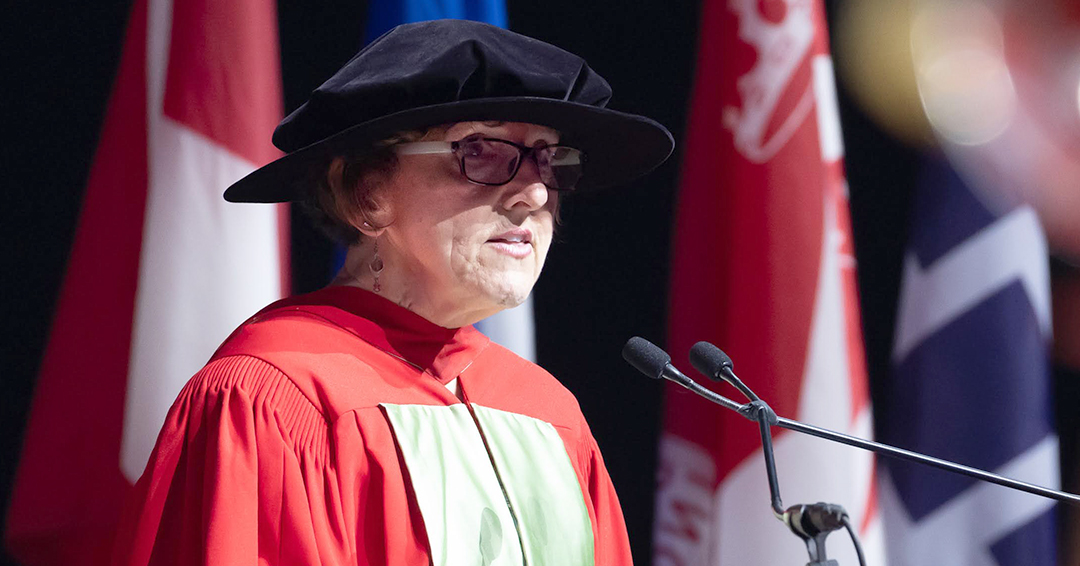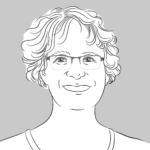
“I followed a path of discovery led by what I loved and what gave me energy, and it changed with time.”
Chancellor McCall MacBain; President and Vice-Chancellor Saini; Ms. Bertrand, Chair of the Board of Governors; Dean Fellows – our first female dean in 200 years of Medicine at McGill; Members of the platform party – including my colleague Associate Dean Snider of the School of Physical and Occupational Therapy; Proud parents and guests; AND Graduating class of 2024:
It is an honour for me to be speaking to you.
This convocation is one of two held today for graduates of the Faculty of Medicine and Health Sciences, recently divided due to the increased number of health professional graduates. This is a measure of the extent to which our society requires the knowledge and expertise that each of you possesses as a direct care provider, researcher, administrator, or educator in each of our disciplines – physical therapy, occupational therapy, and nursing. And let’s not forget the need for strong leadership at all levels – from the bedside in clinical teams to executive suites in the health care system.
I will be stepping down from my current position as Associate Dean and Director of the Ingram School of Nursing in a few short months. The timing of the end of the working phase of my life juxtaposed with the beginning of yours, provides me with a unique vantage point from which to look back at my career in Nursing and share what I’ve learned along the way.
FIRST, I learned to identify what I love and what gave me energy and to use those things to define my career goals and to feel free to change my goals as I grew and learned more.
When I was a pre-teen, I happened to see starving children on the TV news covering of the Biafran War (the Nigerian civil war of the late 1960’s). It was those pictures that led me to an interest in international health.
I didn’t yet know what I wanted to do in health nor where, internationally, but my high school guidance counselor directed me towards a hospital-based nursing school in rural NH.
My studies there allowed me to identify aspects of health that interested me most: direct care delivery, Nursing as a profession, the organization of health care, prevention of disease, and community nursing.
I completed my bachelor’s degree in Washington DC, a city full of embassies, international visitors and cultures. I attended an International Nursing Summer Institute, sponsored by Project Hope – a hospital ship providing health care worldwide. Through these experiences, my interest in international health was re-confirmed.
I completed a Master’s degree in Public Health at Johns Hopkins School of Hygiene and Public Health in Baltimore and went on to run a clinic for migrant farm workers in Maryland and Virginia followed by three years on horseback in the mountainous terrain of Haiti building a public health program covering 15,000 people who had no access to vaccines, clean water, or latrines, and teaching Village Health Workers and Traditional Birth Attendants from those areas. I subsequently consulted for the WHO, the International Planned Parenthood Federation, and the Haitian Health Foundation.
These experiences led me to become interested in evaluating health care so I completed my PhD in Epidemiology & Biostatistics at McGill and gave birth to 4 wonderful human beings. Their births led me to change my goals – I wanted to give them stability and so I turned my attention to international migrants with precarious legal status’ in Canada and began exciting work with researchers in other Western migrant-receiving countries.
My goals changed again when I saw that my School, the Ingram School of Nursing, needed an academic leader.
As you see, I followed a path of discovery led by what I loved and what gave me energy, and it changed with time.
My SECOND major life lesson was that my journey was at least as important as my goals.
I was open to non-traditional experiential learning:
When I worked In Washington DC, as a nurse on a medical-surgical floor and subsequently in the Emergency Department of a low-income Black neighborhood, I learned what it meant to be White in the American south. I was ‘instructed’ by a White Nurse-Manager that I should not be treating Black team members as equals. Apart from that, an older Black nursing assistant with whom I worked would never look at me in my eyes directly, no doubt having learned from her parents how dangerous that could be.
During my time at Hopkins, I learned what a privilege it was for me to be invited as a nurse into the homes of families, usually at times of great vulnerability for them – teenagers having had multiple abortions already, boys in prison, single mothers doing their best to keep the family together and safe.
In thinking about YOUR JOURNEY, remember that there is always more to learn, to do, to grow:
- Keep taking risks;
- Find what is meaningful to you;
- Find what helps others and respond;
- Be passionate and work hard;
BUT don’t forget to:
- Nurture your personal relationships:
- Laugh;
- Celebrate successes;
- Recover from losses; AND
- Be both compassionate & humble
I will end with two quotes:
The first from Ken Burns, known for his production of outstanding historical documentaries:
“Be for something. Be curious, not cool. Feed your soul, too. Every day. […] Don’t confuse success with excellence. Educate all of your parts. You will be healthier. Seek out—and have—mentors. Listen to them. Bite off more than you can chew. Do not get stuck in one place.”
And the second quote from Aaron Sorkin:
“Don’t ever forget that you’re a citizen of this world, and there are things you can do to lift the human spirit, things that are easy, things that are free, things that you can do every day: civility, respect, kindness, character.”
Thank you for your attention and CONGRATULATIONS on this important milestone!

